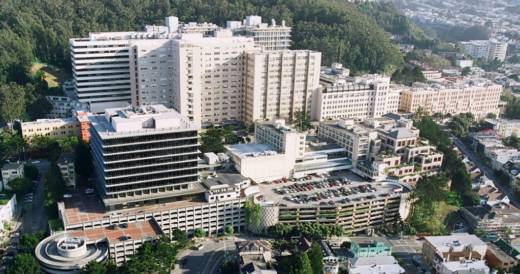UCSF, part of the University of California system, includes schools of medicine, dentistry, nursing and pharmacy. The entire institution is dedicated to health sciences and biomedicine. Tracing its roots back to 1864, the university has five Nobel Prize winners on staff, and an impressive portfolio of scientific achievements, including the discovery of vitamin E back in 1923 and the co-discovery of HIV in 1983.
The new hospital at Parnassus Heights will take over inpatient care now administered in UCSF's Moffitt building, part of the Moffitt-Long Hospital at 505 Parnassus Avenue. Without retrofitting, Moffitt would no longer be able to house patients after 2030, according to state law. The new hospital will also be part of UCSF Health, the health care network launched by the university in 2015.
In 2003, the university opened a more modern campus in San Francisco's Mission Bay neighborhood. The school is just now beginning a year-long planning process to upgrade the Parnassus Heights site. Renovations are part of a $5 billion fundraising campaign, which includes the Diller donation for the hospital.
"The majority of the campus was built between 1950 and the mid-1970s. So the facilities are showing their age," Hawgood said. "We’ll be looking to refurbish many of the research buildings ... Science has moved on; the need for different kinds of facilities are also required."
Diller Largesse
UCSF pushed back the announcement about the donation a couple of days out of respect for the Diller family, who saw its partriarch, Sanford Diller, die last Friday at the age of 89. Diller was a billionaire who made his money as founder of the Prometheus Real Estate Group, one of the largest owners of apartment buildings in the Bay Area.
He and his wife, Helen, who died in 2015, established the Helen Diller Family Foundation in 1999. In 2003, the foundation donated $35 million to create the Helen Diller Family Comprehensive Care Center, at UCSF's Mission Bay Campus. Back then, $35 million was the largest gift by a single donor in UCSF history. But that amount was dwarfed by the family's whopping $500 million donation in late 2015. At the time, it was matched only by $500 million gifts to each of two Oregon universities from Nike co-founder Phil Knight. (Knight also gave $400 million to Stanford in 2016.)
A billion-dollars-plus to a single educational institution, albeit a public one, did get us thinking about the issue of effective philanthropy. So we reached out for comment to Peter Singer, a philosopher, author and professor of bioethics at Princeton University, who has taken a utilitarian approach to charitable giving.
"No, it's clearly not the best use of the money," he wrote in an email. "Health is a vital area for philanthropy, but not in an area that is already, by world standards, extraordinarily well-served ... ."
Why have the Dillers showered so much largesse on UCSF?
"We are native San Franciscans, and are proud to give back to our community,” said Helen Diller, in 2003. “Our family is extremely enthused about cancer research at UCSF. ... (W)e have been presented with the joy of participating in the development of an entirely new section of this very beautiful city.”
She repeated her feelings of attachment to the city, and to UCSF, in a 2009 interview with the San Francisco Chronicle, which provides a good window into some of her motivations. "I was born in San Francisco at Mount Zion hospital. UCSF is known to have the finest scientists and doctors," she said.
She continued: "There is a Hebrew expression, 'Tikkun olam,' which means to repair the world. My parents did things in a small way because that is what they could do. Now we are doing what we are able to do."
The bulk of the initial $500 million Diller donation went toward retaining and recruiting faculty and supporting students at UCSF’s four professional schools, some of it in the form of scholarships. UCSF also created a discretionary $100 million "innovation fund."
The family is also known for contributing to Jewish causes, funding UC Berkeley and UC Santa Cruz Jewish studies programs, renovating the Julius Kahn in the Presidio, and a leadership program for Jewish teenagers.
In recognition of the latest donation, UCSF has renamed its complex of medical buildings on campus as the UCSF Helen Diller Medical Center at Parnassus Heights.
